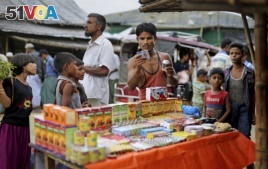14 November, 2018
Abul Kalam sits cross-legged on the floor of his small home and quietly says prayers into a small plastic bottle filled with water.
Kalam says he is creating a potion that will cure stomach pain. He says, "I got these powers in my dreams. People come to me because I heal them."
Kalam is a faith healer, or boidu in the local language. For many years, he has been treating Rohingya Muslims, first in Myanmar's Rakhine state and now at a camp in Bangladesh. Last year about 700,000 Rohingya took refuge in the camp after escaping a campaign of government violence at home.
Faith healers have long been sought out in Rohingya society to treat physical and mental conditions. Their business has survived, in part, because of traditional beliefs and partly because Rohingya rarely receive modern medical care in Myanmar, which has a Buddhist majority. They are considered one of the most persecuted minority groups in the world
Medical care has improved in Bangladesh. Thousands of aid workers there offer Rohingya everything from vaccinations to mental health support.
Doctors Without Borders operates four hospitals and 12 medical centers along the border between Bangladesh and Myanmar. The group says it has provided help to 800,000 patients and admitted another 15,000 patients to hospitals since August 2017.

In this photograph taken Aug. 27, 2018, a Rohingya man looks at medicines being sold on the roadside in Balukhali refugee camp, Bangladesh. (AP Photo/Altaf Qadri)
Yet many Rohingya still want their faith healers.
Sixty-year-old Kalam is a faith healer who arrived in Bangladesh in 2012. He says he receives more than five patients each day.
He says, "People come to me because they benefit from my power. That's why they keep coming back."
Myanmar officials have announced plans to begin bringing Rohingya back to Myanmar this week. Some rights groups have criticized the move. They say it is not yet safe in Rahkine state for the Rohingya.
Anita Saha is a mental health worker who has worked in the camps since August 2017. She says Rohingya refugees' dependence on faith healers comes from a lack of understanding of science and doctors.
Saha says many refugees mistakenly believe they will lose their Islamic faith and become Christians if they take vaccinations for diseases. And in the case of mental conditions, she says, many believe it is caused by evil forces and can be healed with prayer.
"They believe in the boidus to overcome their problem," Saha says. She says beliefs in the camps are slowly changing.
Ali Nesa has never known what is wrong with her teenage daughter. She spends her day lying on the floor of her family's shelter in the refugee camp. She is unable to talk, walk or eat on her own.
Nesa says her daughter has been this way since she was three years old. At that time, she experienced epileptic seizures for nearly two weeks.
Nesa says, "I don't know if her disease is due to an evil spirit or because of difficulty in breathing. If this is because of an evil spirit, then only a boidu can treat her. If it is a breathing problem, then a doctor may be able to help her."
Nesa says none of the many boidus she has visited has been able to help her daughter and she is losing her faith in them. She is now interested in seeking medical help.
Climate extremes and unhealthy conditions make the camps a good place for diseases to spread and people to develop mental health problems.
That means there is plenty of work for doctors. It also means there is plenty of business for faith healers like Kalam, who does not care if people do not believe in his powers.
He says, "I can't be worried by what people have to say. Maybe the doctor will say what does a boidu know? I don't want to answer them. I don't need to fight them."
I'm Jonathan Evans.
The Associated Press reported this story. Susan Shand adapted it for VOA Learning English. The editor was George Grow.
Write to us in the Comments Section or on 51VOA.COM. ___________________________________________________________
Words in This Story
potion – n. a drink that is meant to have a special or magical effect on someone
faith – n. religious belief
persecute – v. to treat (someone) cruelly or unfairly, especially because of race or religious or political beliefs
benefit – n. a good and helpful result
teenage – adj. one between the ages of 13-19
epileptic – adj. action caused by a disorder of the nervous system that can cause people to have violent, uncontrolled movements of the body